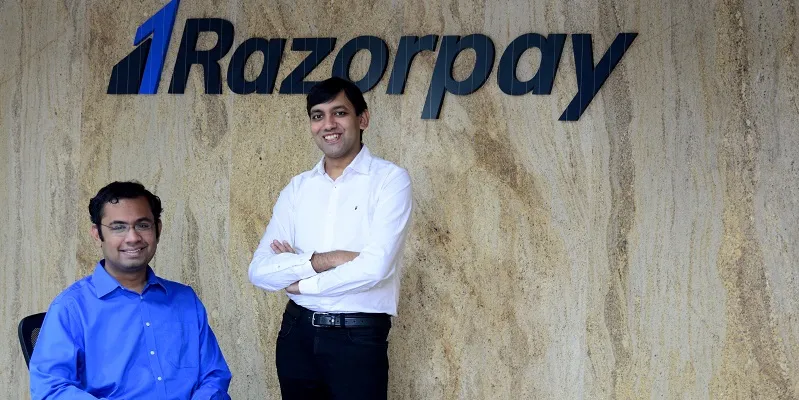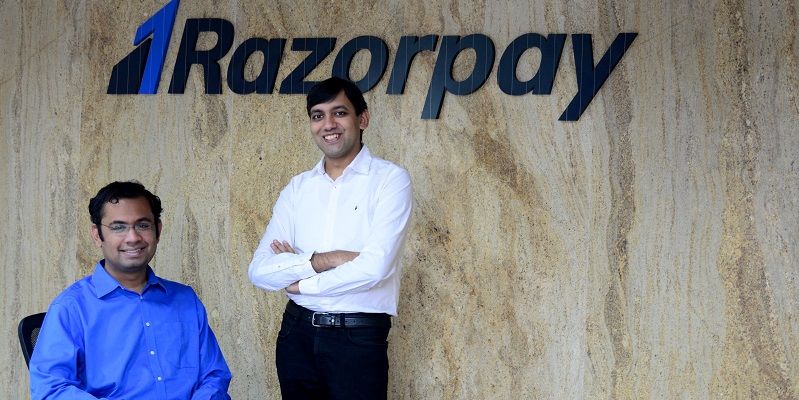Razorpay raises $20 M in Series-B from existing investors, hints at lending and other products
On Monday, online payments platform Razorpay announced that it raised Series-B funding of $20 million in a round led by existing investors Tiger Global and Y Combinator, along with participation from Matrix Partners.
The current round raises the total funding the company has received to $31.5 million. In 2016, it had raised $11.5 million in a Series-A round from the same marquee investors and 33 angel investors. It included a strategic investment by MasterCard too.

Speaking to YourStory, Razorpay founders said that they will use the funding to set up more business verticals, drive adoption and expand their team.
Harshil Mathur, CEO and Co-founder of Razorpay, stated that they plan to take the total team size to 200 individuals from the current 130. A large part of the hiring will be across tech and product teams, as well as senior members to head different product verticals.
Apart from its existing revenues, last September, the payments solution firm also released its version 2.0, which had a stack of products, including automated disbursals, collections for subscriptions, smart collect for high-value RTGS and NEFT transactions as well as automated invoicing, keeping GST in mind.
The company expects to receive 30 percent of its revenues from these four products by the end of this calendar year.
What will the funding be used for?
With five business verticals active at present, the company looks to add close to three more verticals this year.
At present, they are working to integrate UPI 2.0 onto the platform, which is scheduled to launch in the first quarter of 2018. They are also working with BharatQR to make it available to its customer base.
The founders state that they will start pilots around making lending available for its merchants this year. Along this development, the company stated that it will be taking a platform-based approach to solve a problem rather than lending its own capital.
Over the course of this year, the company is also looking to create newer banking products and features for businesses.
Harshil Mathur, CEO and Co-founder of Razorpay, said,
“We are elated to see our marquee investors reinstating their faith in Razorpay and our vision. The results that we have managed to achieve demonstrate the growth of India-focussed SaaS market and its increasing maturity. The idea we are promoting with Razorpay is that there will be one comprehensive and innovative product that will manage the entire money movement for India’s huge underserved business community.”
Speaking on the announcement, Anu Hariharan, Partner at Y Combinator's Continuity Fund, said,
“We are excited to participate in Razorpay's Series B round. The company’s vision and execution over the last three years has shown tremendous results, especially for an India-focused SaaS company. With the online and digital payment space going through a massive transformation in India, their business is only going to grow further.”
As per the RoC data filed by the company, Razorpay’s total revenue grew dramatically, to Rs 25.8 crore in FY 2016-17, from Rs 4.8 crore in FY 2015-16. While it made Rs 21.6 crore in revenues through operations in FY 2016-17, the revenues through operations stood at Rs 79.8 lakh in FY 2015-16.
However, the company incurred loss to the tune of Rs 54.9 lakh in FY 2016-17, as compared to a profit of Rs 28.6 lakh in FY 2015-16.
Customer demographic
While not tracking transactions in particular as a growth metric, the founders claim that at present the company has 65,000 active merchants using their platform. This number stood at 25,000 in December 2016, according to them.
The company is also looking to grow multifold, while aiming to have close to 2,00,000 merchants on the platform by end of December 2018.
Talking about demographics close to 20 percent of their Razorpay’s merchants are from Tier I cities, while the rest are mid-scale merchants. The company’s gateway also powers payments for consumer internet companies like Yatra, goibibo, Zomato, Swiggy and Voonik. It also powers subscriptions for the recently launched Zomato Gold.
Harshil states that close to 50 percent of their customers are from consumer internet sectors like e-commerce, travel as well as food and beverage.
Cost structures
With the launch of version 2.0, the company has activated multiple revenue streams moving forward. The company charges as much as two percent on every transaction made through their payment gateway.
Smart Collect
While invoicing continues to be free, the company charges a flat fee of Rs 50 for high-value transactions through Smart Collect. Smart Collect allows companies to automate collections for large transaction sizes ranging from Rs 25,000 to Rs one lakh and even more through the gateway.
In normal scenarios, these are bank transfers made through RTGS and NEFT.
Subscription
Razorpay also charges 0.25 to 0.5 percent fees on every subscription collection transaction made through their gateway.
It is now looking to increase its average product adoption from one to two.
Last October, MobiKwik relaunched its payment gateway Zaakpay as MobiKwik Payment Gateway. With this relaunch, the company was aiming at transactions worth over $5 billion on the platform by end of FY 2018.







